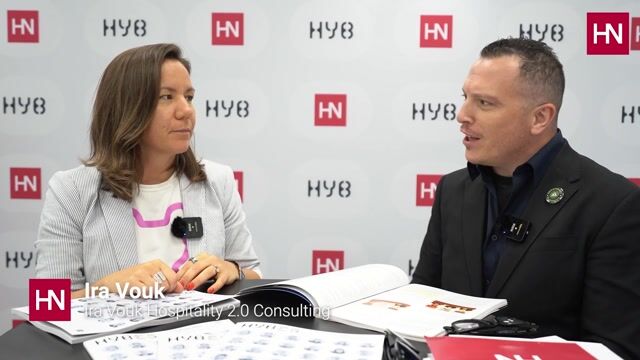
At HITEC 2025 in Indianapolis, we caught up with Ira Vouk, Editor-in-Chief of the 2025 edition of the Hotel Yearbook – Technology Edition. A respected voice in hospitality tech, Ira curated a remarkable collection of essays from over 35 industry leaders, each offering their outlook on where hotel technology is heading. In this interview, she reflects on the themes, surprises, and controversies behind the publication, and shares her own bold view on how AI could disrupt the long-standing standards that have held hotel tech together , or perhaps back.
What is the theme of this year’s Hotel Yearbook and what makes it stand out?
This edition of the Hotel Yearbook focuses on technology and was launched at HITEC 2025. Ira explains the aim was to bring together insights from across the industry , from both veterans and emerging voices , to better understand where hotel tech is headed. The diversity of viewpoints, even on the same topic, reveals just how fragmented and complex the industry remains. It is less about predicting the future and more about understanding the present to anticipate what might come next.
Your article declares, “Standards are dead. AI is the future of hotel tech integration.” Can you explain?
According to Ira, traditional standards for tech integration have been limiting innovation. These standards, built over decades, were never meant to accommodate the explosion of creativity and new data sources introduced by today’s startups. AI, she argues, provides a more dynamic, flexible way to create integrations without forcing every system into outdated frameworks. It could allow new vendors to scale without waiting years to integrate with legacy PMS systems.
Why has PMS integration been such a roadblock for innovation?
The hotel industry still revolves around the PMS as the core of the tech stack. Because the PMS contains vital operational and financial data, other tools must integrate with it. But with over 1,200 PMS solutions out there , many of them legacy systems without APIs , integration is often slow, expensive, or impossible. This dependency stifles innovation and keeps new players out. Ira believes AI could finally help break that barrier.
Do you think the current system is intentionally closed off?
While she acknowledges this is a sensitive topic, Ira suggests that some legacy vendors may have had little incentive to open up. But as hoteliers demand more flexibility, better integrations, and personalization tools, they are starting to walk away from closed systems. Cloud-based PMS platforms with rich marketplaces are gaining traction, not because they offer better software, but because they are more open.
Are we moving toward an “agent-first” tech stack?
That might be the case. Ira says the PMS became the centre of the tech stack by default, not by design. It holds core data like reservations and billing, so other tools rely on it. However, with the rise of AI agents capable of working across systems, we could be entering a phase where intelligent agents, not static systems, orchestrate the stack , shifting power away from monolithic PMS solutions.
Were there any standout articles or ideas in the Yearbook?
Beyond her own piece, Ira was particularly moved by contributions addressing the balance between high-tech and high-touch hospitality. Several authors tackled the tension between automation and human connection, offering nuanced views on how technology can support , not replace , meaningful guest interactions. She also highlighted the diversity of opinions around “best of breed” versus “end-to-end” solutions, showing how there is no one-size-fits-all approach in hospitality tech.
How do you see AI affecting jobs in hospitality?
Ira acknowledges the fears many professionals have, but remains optimistic. She often tells her students, “AI will not replace you. People using AI will.” The tools that are emerging today allow individuals to build, automate, and innovate without technical training. Rather than eliminating roles, AI may shift human work toward more creative and emotionally intelligent tasks. In her view, this is already creating new innovation streams, and that trend will only grow.
About Ira Vouk Hospitality 2.0 Consulting
Hospitality 2.0 offers consulting and coaching services as well as strategic business advisory in the hospitality industry with focus on technology, distribution, revenue/profit management and software product management.
I am dedicated to helping my clients become more efficient and successful, drive revenue and maximize profits as well as build product roadmaps. To book a consultation, visit https://iravouk.com/
Please visit:
Our Sponsor
